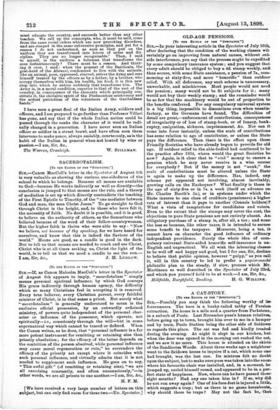OLD-AGE PENSIONS.
[To THE EDITOR OP TRH "SrsorAToi.")
SIR,—In your interesting article in the Spectator of July 16th, after declaring that the condition of the working classes wib certainly go on improving from natural causes, without out- side interference, you say that the process might be expedited by some compulsory insurance system ; and you suggest that every adult should be obliged to buy a 4d. stamp weekly, andi thus secure, with some State assistance, a pension of 7s., com- mencing at sixty-five, and more " honorific " than outdoor relief. With all deference, any such scheme is unnecessary, unworkable, and mischievous. Most people would not need the pension; many would not be fit subjects for it ; many would not buy their weekly stamp ; and the remainder would be so few that the machinery would be out of proportion to the benefits conferred. For any compulsory universal system is a big thing, impossible to discontinue even when unsatis- factory, as the Germans have found. The difficulties of detail are great,—enforcement of contributions, consequences. of irregularity or of loss of stamp-book, or of lunacy, bank- ruptcy, emigration, sickness, imprisonment, gm Nor can it come into force instantly, unless the scale of contributions- has some relation to age of contributor, or unless the State- pays the difference. Then there is the effect upon those Friendly Societies who have already begun to provide for old age. If outdoor relief to the able-bodied had continued to be- the practice after 1834, where would the great Societies be- now ? Again, is it clear that to "sink " money to ensure a. pension which he may never receive is a wise course- for everybody ? But if the money is not "sunk," the scale of contributions must be altered unless the State is again to make up the difference. Has, indeed, any scheme yet appeared not involving, almost inevitably, growing calls on the Exchequer ? What finality is there in the age of sixty-five or in 7s. a week (itself an advance on Mr. Charles Booth's 5s.), or in systems under which the State insures to one class of creditors (pensioners) a higher rate of interest than it pays to another (Consols holders) fc What a vista of temptations for candidates and voters. Even to the extent that the stamps may cover the cost, the objections to pure State pensions are not entirely absent. Am obligatory purchase of a stamp is, after all, a tax ; and none- the less so because, like other taxes, it is intended to secure- some benefit to the taxpayer. Moreover, being a tax, it cannot have on character the good influence of ordinary independent providence. Surely the whole idea of com- pulsory universal State-aided honorific self-insurance is un- English and unpractical. We all wish the labouring classes- to be well off and happy and good, but I for one, Sir, decline- to believe that public opinion, however " pulpy," as you call it, will in this country be led to prefer a papier-mache- philatelic plan to the steady, if slow, process which Mr.. Martineau so well described in the Spectator of July 23rd, and which you yourself hold to be at work.—I am, Sir, &c.,
Hillfields, Burghfield, Reading. H. G. WILLINK.


































 Previous page
Previous page